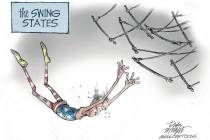Parents could go bankrupt simply trying to look adequate
Why can so few people seem to save any money? The number of people scraping along from paycheck to paycheck is astonishing; surveys routinely find that somewhere between a third and half of all Americans don’t have the savings to fund ordinary emergencies — a moderately large repair, a month with no income.
These are not the kind of astonishing runs of bad luck that no one could realistically expect to cover, like a $100,000 medical bill, or a multi-year illness that makes it impossible to work. They’re just the normal vicissitudes of regular life, and somehow, Americans are unprepared.
These are the questions that Neal Gabler tackles in a recent article for the Atlantic. The answer he arrives at boils down to: we need to keep up with the Joneses, only our incomes aren’t growing, or even stable in the face of inflation, and meanwhile, access to credit enables us to live, for a while, as if that last part weren’t true. The result is a recipe for disaster. Or at least, for Neal Gabler’s disaster.
Gabler has done something very brave: He has confessed his own personal financial disaster, rather than making vague remarks about all the trouble other people are having. That’s hard to do, for people are more furtive about their financial lives than about almost any other topic. You can open any magazine and find someone gaily chatting about their last five sexual encounters; find books and books about the loss and redemption of getting fired or going to prison. But it is very hard to find people confessing to something we all do an awful lot of: worrying about money.
To be sure, Gabler is perhaps not as brutally honest with himself as he might be. “I never wanted to keep up with the Joneses,” he says, while recounting his decisions to live in Brooklyn, and then in the Hamptons, while sending his daughters to private school and expensive colleges. This is keeping up with the Joneses, of course. Gabler happens to belong to a social class in which the markers of success are living in the orbit of an expensive coastal city and educating your children at an elite school, not necessarily driving a fancy car or having a second home on some Florida golf course. Yet the former often costs more than the latter would. The majority of the people in the world do not live in the New York metropolitan area, and do not send their kids to Stanford University, and yet they somehow manage to get through their days — even, I dare say, to occasionally live worthy lives and die happy.
I say this not to rake Gabler over the coals particularly; note that I too live in D.C., an expensive city, even though our money would undoubtedly go much further in exurban Virginia, or western Kentucky for that matter. Rather, I say this to suggest that the primary reason people have so much trouble saving is that they can always find a reason to justify not doing so. The details of what they’re spending on may change, but the justifications have a curiously similar sound to them.
After all, the personal savings rate peaked decades ago, when incomes were, for most people, not lower than they are now. People in the 1970s saved more because in general, they spent less money on stuff. Their houses were smaller, they were hawkish about turning off lights and keeping the thermostat down, they had fewer cars, fewer televisions, and yes, fewer years of education. Their health care was cheaper, but that was in large part because there was less health care available to be bought — many of today’s drugs and procedures having not yet been invented. And even leaving aside health care and education, we can’t really defend the decision to buy more of everything else rather than saving as a necessity. It’s not as if my generation’s parents were exactly living in squalor back when the savings rate was high.
So how has this happened? Well, for one thing, it’s a lot easier not to save than it used to be. The refinement of credit rating and the relaxing of state regulations that often made it hard to extend credit has resulted in much greater access to borrowed cash than my parents had when I was born. The extent of this revolution can be exaggerated — before there were credit cards, there were store credit cards and installment plans (in the delightful Irish turn of phrase, “buying on the never-never”). But widespread credit has certainly made it somewhat easier for people to scrape by without a rainy day fund, or even any cash in their pocket at all. At least until, as we saw in 2008, the banks suddenly realize their exposure and cut back on the draw.
And as I say, people can always come up with a reason. Frequently, in my experience, that reason is a) all I want is the bare minimum decent life enjoyed by every other member of my social class and b) children. The former justification is exacerbated by the fact that we are so furtive and shame-ridden about our finances, so people often don’t realize how often our neighbors’ “bare minimum decent life” is hired on credit. The latter is exacerbated by the fact that it’s hard not to want to give the best to your kids.
On the East Coast, affluent parents of bright children explain that they absolutely must live in the best possible school district, and send their kid to the most prestigious possible college. In “flyover country,” parents explain that they have to have a nice new car for the kids because it’s safer. Also a bevy of very expensive activities, from travel sports to marching band, because otherwise their lives will be blighted. Auto accidents are declining, and bright, motivated kids are probably going to do OK no matter where they go to school. Yet parents can convince themselves to spend near-infinite amounts seeking marginal improvements.
The problem is worst on the coasts, where those amounts really do seem to spiral toward infinity (but of course, incomes are higher there, too). But it’s everywhere; people are locked in a status arms race that often comes to focus on the happiness or safety of their kids.
I’m not deriding those folks, only pointing out the behavior. Because the only people who can stop the self-bankrupting arms race are the people participating in it. And the only way they can do so is to start deliberately sitting out the competition. Untold generations of human beings have lived to adulthood without the blessings of a brand-new minivan, a travel soccer trophy or a Harvard education. Modern children raised without them will probably also be fine.
Unfortunately, I’m not sure how much good it does to point this out. The truth is that your kids will care about how nice your car is, about whether they can be on travel hockey with their friends, about whether they can go to fancy schools like their friends. And if you were raised in a social class that regards any of these things as the basics of a decent life, you will feel horrible about denying them. It’s the mother of all collective action problems: If all the parents agreed at once to stop this mad arms race, everyone could breathe easy and have a more secure life. But as long as some of the parents provide those things, everyone else’s kids will want them too … and their parents will long to deliver.
Hillary Clinton named one of her books after the proverb “It takes a village to raise a child.” The modern corollary is probably “It takes a village to make raising a child cost so darn much.” And the village has gone mad.
Megan McArdle is a Bloomberg View columnist writing on economics, business and public policy.























